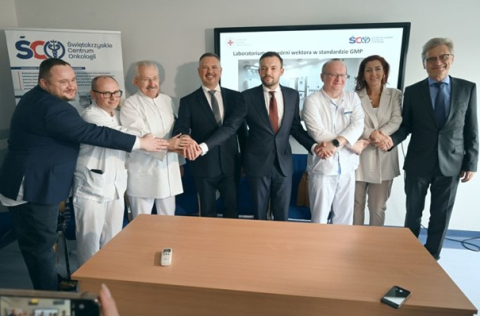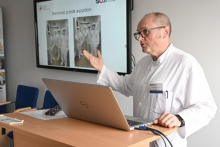The project, in the course of execution for two years, is focused on finalizing the CAR-T therapy, including manufacture of CAR-T products in Poland. This will improve the availability of this innovative treatment, reduce its costs and build a network of competent treatment centers. All the measures are funded by the Medical Research Agency (read more about the project here).
What is CAR-T therapy
CAR-T therapy is based on technologically advanced form of immunotherapy with genetically engineered T cells. These cells (lymphocytes) are obtained from the patient’s blood and transferred to a lab where they are subject to genetic programming and modification so that they can recognize cancer features. The cells are then multiplied, stimulated and returned to the patient through intravenous infusion. As soon as they reach the blood, CAR-T cells will identify and destroy cancer cells.
The function of viral vectors
One of the key stages of CAR-T strategy is the production of viral vectors to a clinical standard, which is the intended role of the new production site at the Świętokrzyskie Oncology Center. The Center is responsible within the project for preparation of the so-called lentivirus vector.
– What it means in practice is that our production site will be manufacturing the lentivirus vector as a carrier to encapsulate the genetic information. We will then be sending this carrier to the centers to be involved in the subsequent phase, using the vector for transduction, i.e. infecting T lymphocytes taken from the patient, obviously in a laboratory environment. Based on the supplied genetic information, the patient’s T cells will build a receptor on their surface that will enable them to identify cancer cells and they will destroy such cancer cells - explains Artur Kowalik, PhD, professor of Jan Kochanowski University of Kielce, Head of the Molecular Diagnostics Department at the Świętokrzyskie Oncology Center and the Genetic Engineering Institute of which the production site is a part.
How advanced is the project
The vectors are being tested now and readiness for manufacture at full capacity is scheduled for November. However, this is only one of the component parts of the CAR-T product. The work on the antigen recognition part which actually affects cancer cells is pending simultaneously at the laboratory of the National Oncology Institute and the Medical University of Lodz, in collaboration with WUM. Clinical trials involving the CAR-T products developed in the project will start in late 2024, covering acute lymphoblastic leukemia (ALL) and diffuse large B-cell lymphoma (DLBCL) patients.
Who executes the project
The project is executed by CAR-NET Consortium. In addition to our University, the following other institutions are members of the Consortium: Poznan University of Medical Sciences; Medical University of Lodz; Pomeranian Medical University in Szczecin; National Oncology Institute, Warsaw and Gliwice branches; Świętokrzyskie Oncology Center; Hematology and Transfusion Medicine Institute; university hospitals in Warsaw, Lodz, Poznan, Szczecin and Bydgoszcz.
Who attended the opening of the production site
The lentivirus vector production site opening ceremony at the Świętokrzyskie Oncology Center in Kielce was attended by such guests as: professor Stanisław Góźdź, director of the Świętokrzyskie Oncology Center; professor Radosław Sierpiński, President of the Medical Research Agency; professor Zbigniew Gaciong, Rector of the Medical University of Warsaw (WUM); professor Artur Kowalik, Head of the Molecular Diagnostics Department at the Świętokrzyskie Oncology Center and the Genetic Engineering Institute; Radosław Zagożdżon, PhD hab., leader of the CAR-NET project.
Fot. Dawid Łukasik

